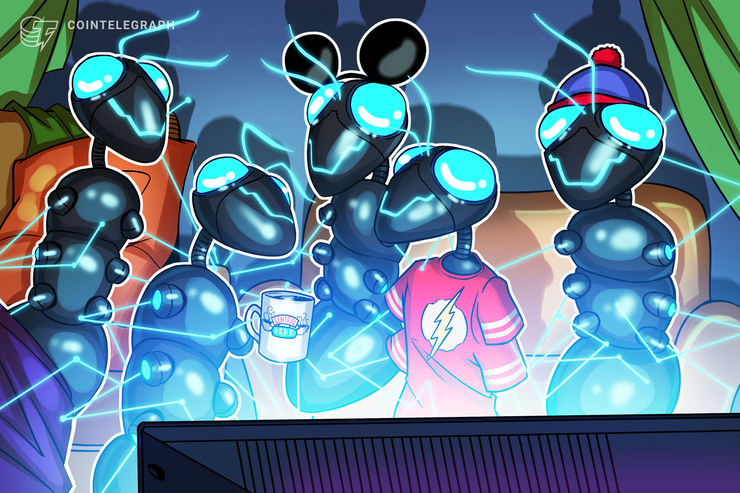For the past few months, the modern world has witnessed TV providers battle it out for the exclusive streaming rights for consumer-favorite shows such as Seinfeld, Friends, The Big Bang Theory, The Office and South Park.
On Nov. 12, Disney took the industry by storm with the release of its Disney+ streaming platform, which attracted over 10 million subscribers within 24 hours. This has called into question the continued viability of other streaming platforms, such as Netflix, who recently announced its partnership with Nickelodeon in an effort to compete with Disney+. The new streaming service has forced competitors and programming distributors to come up with new advancements, fast.
Yet, out of all the excitement, there has been one aspect of programming that has been overlooked almost entirely — the pay-per-view technology. Yes, that old model where one has to spend $10 to watch a movie that isn’t out yet on DVD or Netflix.
While Disney has very little to do with blockchain technology and digital currencies (to our knowledge), industry leaders such as Salesforce co-founder and CNET founder Halsey Minor believes he has found a way to decentralize the traditional PPV model, bringing it into the homes of over 60 million Americans and into the hands of over 200 North American TV service providers before other media giants get the opportunity.
Why so serious?
Beyond the success of both CNET and Salesforce, Minor also had his voice and hands in the technologies behind Google Voice, OpenDNS, and NBCi. Minor’s media company, Live Planet, wants to implement the VideoCoin Network on the Blockchain for real-world cases, beginning with the decentralization of PPV. In June, Hanno Basse, the former chief technology officer at 20th Century Fox Film Corporation, joined Live Planet as its president of the Decentralized Media Solutions division.
As reported by CryptoX, Live Planet announced its plans back in August to imminently launch a blockchain-based virtual reality network called the Blockchain Virtual Reality Network, which would be used to host crypto and other blockchain-related content.
But how can a token-based solution help transform a traditional viewing model such as PPV?
Disturbing the TV signal
Traditionally, the PPV model hasn’t been entirely seamless, at least in today’s digital age. PPV is designed to “push out” non-subscribers from the viewing experience, making its content more appealing. This is similar to Netflix or Hulu requiring someone to subscribe to its platform to access its content, but with one difference: PPV’s model is founded upon a transactional model — you pay for each viewing.
Arguably, PPV hasn’t been as appealing to viewers, particularly younger viewers. That is, until technologies like KODI came out. Users have thus become able to install its open-source tech on their Amazon Firestick and Windows operating systems to bypass viewing restrictions on paid content.
That’s where VideoCoin’s newest partnership with iNDEMAND comes into play. As the first major media participant to be publicly announced by VideoCoin. iNDEMAND distributes premium video-on-demand and pay-per-view entertainment, including movies and sports programming, to more than 200 North American TV operators, reaching over 60 million homes. Minor said during the announcement:
“They are a key player in the video industry and together we will shape the next generation of video processing infrastructure to meet not only the needs of traditional media companies like iNDEMAND, but also serve emerging massive demand for low-cost video processing related to the connected-life ecosystem, such as video doorbells, connected security cameras, and social apps.”
Owned by Charter Communications, Comcast Cable, and Cox Communications, iNDEMAND manages 500,000 unique video assets and maintains an archive of more than 5 petabytes of data — roughly 1000 terabytes.
Live Planet established its Innovators Program to help bring major media companies and video distributors into the commercial development of the VideoCoin Network to ensure delivery of quality, functional and robust content to customers.
It’s worth mentioning that this isn’t an attempt to compete with streaming providers, which CryptoX confirmed with John Ward, executive vice president and chief technology officer of iNDEMAND last week:
“iNDEMAND does not compete directly with streaming providers like Disney+ or HBO Max, as they are more of a cable industry mainstay.”
Today, we are used to traditional pay-to-play methods for cable programming. Now, we are in the age of digital streaming and offline downloading, where cable providers such as Disney, Viacom, WarnerMedia and others are beginning to shift their infrastructures to appeal to viewers who are focused on genre rather than content as a whole.
Coins as a viable solution?
So with this new announcement, how can a token-based solution come into play with a concept such as Minor’s, without bringing us back to square one of requiring a bulky and overwhelming pay-per-view package?
In my opinion, it’s going to require a complete analysis of the streaming demographic in the United States — yes, taking into consideration the different types of streaming platforms consumers are paying for and using, all while exploring the types of content they find most entertaining.
Why? Because who seriously pays for PPV anymore, short of going to a bar and watching the latest UFC or boxing fight? By migrating PPV-tech onto a blockchain, viewers will hopefully be provided with a more seamless and cost-affordable means of viewing.
What about privacy?
As this announcement continues to develop, the main concern is more focused on consumer privacy protections, which is still in the process of being established by iNDEMAND. However, Ward says that procedures are still being developed ahead of the launch:
“As this partnership with VideoCoin will allow iNDEMAND to do commercial testing and delivery before it fully launches in 2020, we cannot yet comment on consumer privacy protections, as those are still being developed.”
As the battle in cutting the cable continues in tandem with the battle for TV streaming and syndication rights, iNDEMAND anticipates staying relevant and will “continue to look for opportunities to provide quality content without friction,” as Ward emphasized.



